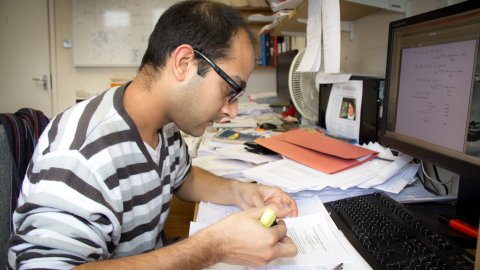Global well-posedness of the axisymmetric Navier-Stokes equations in the exterior of an infinite cylinder
Abstract
11:00
Algebraic spaces and Zariski geometries.
Abstract
I will explain how algebraic spaces can be presented as Zariski geometries and prove some classical facts about algebraic spaces using the theory of Zariski geometries.
Block Preconditioning for Incompressible Two-Phase Flow
Abstract
Modelling two-phase, incompressible flow with level set or volume-of-fluid formulations results in a variable coefficient Navier-Stokes system that is challenging to solve computationally. In this talk I will present work from a recent InFoMM CDT mini-project which looked to adapt current preconditioners for one-phase Navier-Stokes flows. In particular we consider systems arising from the application of finite element methodology and preconditioners which are based on approximate block factorisations. A crucial ingredient is a good approximation of the Schur complement arising in the factorisation which can be computed efficiently.
Reduction Types of Abelian Varieties
Abstract
Much of the arithmetic behaviour of an elliptic curve can be understood by examining its mod p reduction at some prime p. In this talk, we will aim to explain some of the ways we can define the mod p reduction, and the classifications of which reduction types occur.
Topics to be covered include the classical reduction types (good/multiplicative/additive), the Kodaira-Neron reduction types that refine them, and the Raynaud parametrisation of a semistable abelian variety. Time permitting, we may also discuss joint work with Vladimir Dokchitser classifying the semistable reduction types of 2-dimensional abelian varieties.
IP sets, recurrence, and polynomials
Abstract
I will discuss the many appearances of the class of IP sets in classical theorems of combinatorial number theory and ergodic theory. Our point of departure will be the celebrated theorem of Hindman on partition regularity of IP sets, which is crucial for the introduction of IP-limits. We then discuss how existence of certain IP-limits translates into recurrence statements, which in turn give rise to results in number theory via the Furstenberg correspondence principle. Throughout the talk, the methods of ergodic theory will play an important role - however, no prior familiarity with them is required.
Characterising the Integers in the Rationals
Abstract
Starting from Hilbert's 10th problem, I will explain how to characterise the set of integers by non-solubility of a set of polynomial equations and discuss related challenges. The methods needed are almost entirely elementary; ingredients from algebraic number theory will be explained as we go along. No knowledge of first-order logic is necessary.
Some Theorems of the Greeks
Abstract
I will give a historical overview of some of the theorems proved by the
Ancient Greeks, which are now taken for granted but were, and are,
landmarks in the history of mathematics. Particular attention will be
given to the calculation of areas, including theorems of Hippocrates,
Euclid and Archimedes.



